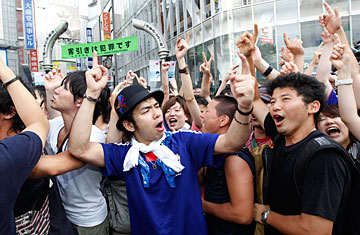
Japanese soccer fans celebrate in Tokyo after Japan beat the U.S. in the Women's World Cup final in Frankfurt on July 18, 2011
It was a needed miracle. Japan's Women's World Cup win against the U.S. is not only one of the country's greatest sporting triumphs, it is a shot of welcome inspiration for a nation still reeling from the March 11 earthquake and tsunami disaster. "Even though the Japanese team is physically smaller than the Americans, they had the strong mentality to win," says Jun Hajiro, 36, amid a wildly cheering crowd at one of Tokyo's top sports bars. "They played for Japan and our recovery."
With a level of technique that was as beautiful as it was lethal, the team lived up to its nickname Nadeshiko — or "beautiful flower" — with a 3-1 win on penalty kicks during the match in Germany on Sunday. But with team members averaging just 5 ft. 4 in. (163 cm), "petite powerhouse" might be a more appropriate moniker.
As the clear favorites, the U.S. team had the advantage of height and speed, dominating the start of the game. Twenty-four minutes into the second half, the U.S. got the opening goal. But 12 minutes later, Aya Miyama tied the game. The second half ended in a draw sending the game into overtime. At 14 minutes into overtime, U.S. team favorite Abby Wambach scored with a header and gave the U.S. a 2-1 lead, but again, soon after, Japan's captain and tournament MVP Homare Sawa pushed in another score bringing the game to a 2-2 draw that lasted until the end of the period.
"I can't believe it," Sawa, a five-time World Cup veteran, told reporters after the game. "We won because we never stopped fighting until the end. This has been my goal and now we can take home the gold trophy." During the following penalty shoot-out, Japanese goalie Ayumi Kaihori succeeded in blocking two U.S. kicks, giving Japan its first soccer championship. Japan had not won against the U.S., the top-ranked, two-time champion, in their last 24 encounters.
Coach Norio Sasaki's calm confidence helped push the team onward. "My girls really played their hearts out," he told the press after the game. "You never know which way it is going to go in a penalty shoot-out but we stayed cool. I am really surprised."
It was a joyous, unexpected surprise for most fans in Japan, who had been happy enough that the team made the finals. "This is a turning point for Japan," said Kohei Kimizu, 28, shouting above the roar of a packed Roppongi crowd. "The U.S. has been ranked No. 1 so we didn't think we could win. It's a great day for the country."
Though they were underdog at Frankfurt, the Japan squad has had its share of successes over the past 20 years. They placed fourth at the 2008 Olympics and have appeared in each of the six Women's World Cups since 1991. They also had a win at the 2010 Asian Games in Guangzhou, China.
Incredibly, their rise has come with little financial backing. It was only five years ago that the Japan Football Association put more resources into women's soccer. Corporate sponsorship has been minimal, Japan's L-League is nonprofessional (unlike the U.S. Women's Professional Soccer league) and many players have had to keep day jobs, with practice in the evenings, to make ends meet. There are only 25,000 girls registered to play youth soccer in Japan, compared with around 200,000 girls registered in California alone.
This win could give those numbers a boost. "The team looks so cool, and so beautiful at the same time," says Emi Murai, 29. "I'm sure they'll inspire many more girls to play soccer." Her husband Shintaro Takahashi, between exuberant hugs with fellow fans and strangers, adds, "I've been following women's soccer since the 2008 Olympics." The display of affection, unusual in Japan, was infectious at a game like this, when so much emotion was riding behind it.
Coach Sasaki has time to build interest in the game. In Japan, soccer is played 365 days a year, not seasonally as in many other countries; training long and hard at any sport is a time-honored custom. Kids concentrate on only one sport, and the search for members of the women's national team starts at age 12. "Japan's women are strong, like the team," says Katsuhiko Ikeda, 56, as he steps out of the bar into the morning sunshine at the end of the game. "Now the men will have to improve."
